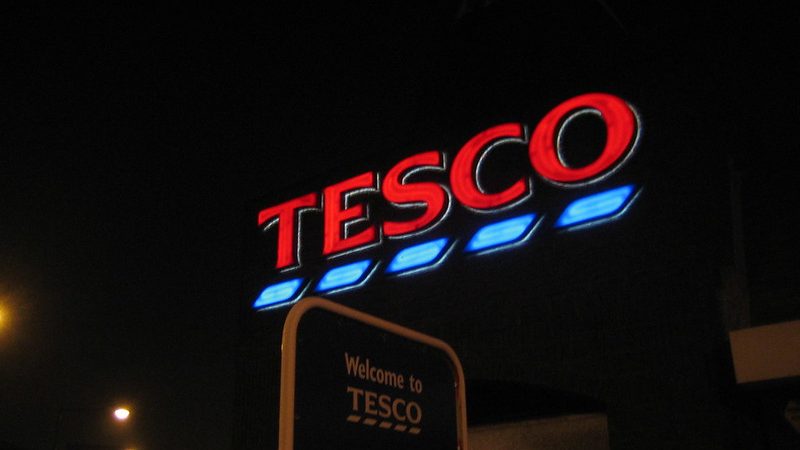‘There has been an ‘abject failure’ in leadership from the government who have done absolutely nothing to reduce these staggeringly excessive profits of supermarkets like Tesco.’

Unite has accused Tesco of ‘rampant profiteering’ and the government of doing nothing to reduce staggering corporate profits after it was announced the retail giant recorded ‘obscene’ profits for a second consecutive year.
On April 13, Tesco’s latest figures were announced by the stock exchange. Despite being down on last year’s pre-tax profits of £2 billion, this year’s figures show the company earned £1 billion in profit, at a time when the cost of food continues to soar.
‘Excessive profiteering’
In the 12 months to the end of February, Tesco’s sales increased by more than 7 percent to £65.8 billion.
With a 27 percent share of the supermarket sector in the UK, Tesco is the country’s biggest supermarket.
Unite accused the retailer of ‘excessive profiteering.’ General secretary Sharon Graham said:
“Tesco’s profits are another example of excessive profiteering fired up by astonishing corporate greed. It’s this rampant profiteering which is driving inflation, and cranking up the cost of living crisis for workers and their families.”
As the UK’s largest supermarket enjoys huge profit, figures show that around 3 percent of families in Britain – at least 2.1 million people – used a food bank in the year to March 2022. The figure rose to around 1 in 9 people – 11 percent – for families who receive state income benefits.
According to the first figures on food bank use by the Department for Work and Pensions, households in the north of England and Scotland were more likely to have used a food bank in the last 12 months compared to the rest of the country.
Heather Buckingham, director of policy and research at the Trussell Trust, which works to end the need for food banks in the UK, told the BBC the figures were “deeply concerning” but “sadly not surprising”.
She called on politicians to guarantee that the basic rate of Universal Credit was calculated so it would always at least cover the cost of essentials.
Unite’s Sharon Graham asked how can the nation’s biggest supermarket be profiteering as never before when millions of people are struggling to feed their families.
“What sort of country have we become? Frankly, the latest results are obscene,” she said.
‘Abject failure’ from government leadership
The union general secretary said there has been an ‘abject failure’ in leadership from the government who have done “absolutely nothing to reduce these staggeringly excessive profits of supermarkets like Tesco.”
The union noted how shareholders continue to be rewarded with huge bonuses. In 2021/22, dividends were paid out at a value of £704 million. In July 2022, the retailer began to roll out a £1 billion share buyback scheme, in what will equate to another big payday for shareholders.
Tesco’s bumper profits come as food inflation rises to an incredible 18.2 percent, the highest since 1978.
Market analysts Kantar said that due to supermarket inflation being at a record high, an average £837 has been added to household annual bills.
Research by Unite, which analysed the FTSE 350, reveals that the profit margins of the UK’s supermarkets has increased by 89 percent since 2019.
‘Greedflation’
The union has described large corporations fuelling inflation by excessive profiteering as ‘greedflation.’
Sharon Graham said: “Despite the rise in wholesale prices, Tesco, Sainsbury’s and Asda still managed to increase their profits by an astonishing 97% in 2021. At the same time the 8 top UK food manufacturers made profits of £22.9 billion. Profiteering is happening right along the food supply chain and workers are paying the price.
“It’s more evidence that the British public are hostage to greedflation. It’s time our elected leaders and policy makers woke up to corporate greed and challenged it head on.”
LFF reached out to Tesco for commentary. We were pointed to the comments the company’s CEO, Kevin Murphy, made during the annual results media call.
Murphy said: “Our profits fell by 7 percent this year and that is despite the fact that we achieved a record level of cost savings. So, I think that for me is a very material proof point that we worked very hard for both customers and for colleagues during this last financial year.
“Being a financially strong robust business is very important for the future health of the food supply chain in the country, for our suppliers, for all the colleagues that we employ, the 330,000 people that we employ, this is a very important thing.
“We’re the most competitive we’ve ever been in the market relative to all the other grocery retailers in the country. And at the same time, we’ve been able to look after colleagues through a 15 percent pay increase in less than 12 months. And we’ve been very supportive of our suppliers, particularly the ones that have struggled through this last year.”
Gabrielle Pickard-Whitehead is a contributing editor to Left Foot Forward
Image credit: Creative Commons – Gordon Joly
To reach hundreds of thousands of new readers we need to grow our donor base substantially.
That's why in 2024, we are seeking to generate 150 additional regular donors to support Left Foot Forward's work.
We still need another 117 people to donate to hit the target. You can help. Donate today.



